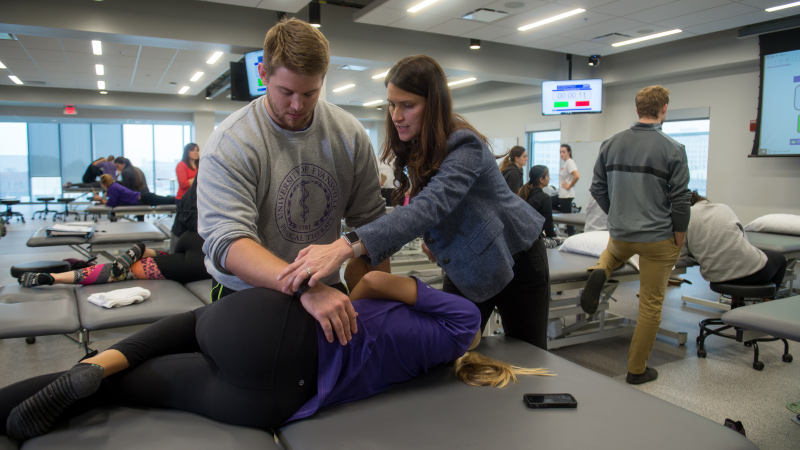Mission and Impact
Mission Of The Physical Therapy Program
The University of Evansville's Doctor of Physical Therapy Program's mission is to develop licensed movement system experts who positively impact the communities in which they live, work, and serve.
Program Vision Statement
The University of Evansville's Doctor of Physical Therapy vision is to be the leader in developing physical therapists who advance the profession through utilizing and creating the best available evidence, are life-long learners who are well-rounded and diverse, are positive agents for change, live out their purpose and strive to create life satisfaction, and positively impact the society.
Philosophy of the Physical Therapy Program

The curriculum promotes the values of the University and the core values of the American Physical Therapy Association. The program provides an individualized path to excellence through contemporary didactic and clinical practice experiences. These experiences expose students to the diverse and culturally sensitive nature of health care. To prepare graduates to be leading movement system experts who are committed to lifelong learning, the curriculum stresses the importance of making practice decisions based on current best evidence.
The educational process is guided by physical therapy faculty members who emphasize a student-centered learning approach to enhance student success and develop positive agents of change. Faculty members are committed to excellence in teaching, service, and scholarly activities that contribute to the community and knowledge base of rehabilitation science.
Education
Undergraduate education, didactic professional education, and clinical education are the three critical components that prepare students to engage in the contemporary practice of physical therapy. The experiences inherent in these three elements are mutually supportive, with each component enriching and reinforcing the others. In accordance with the University mission, the professional phase of physical therapy education seeks to assist students in the realization of their full potential. The core values of the profession are presented in the first course within the professional phase. These values are reinforced and nurtured throughout the curriculum through didactic, clinical, and service-learning experiences.
The professional curriculum includes both didactic and clinical components. The didactic component (including classroom, laboratory, and self-directed activities) ensures that students have the necessary knowledge base to care for patients/clients competently and compassionately. Skills acquired during completion of prerequisites are reinforced and further developed, including self-directed learning, critical thinking, and reflective inquiry.
Clinical education experiences provide students opportunities to apply and refine acquired didactic knowledge, psychomotor skills, and professional behaviors to assess and treat patients/clients in a supervised environment. Exposure to diverse patient populations and settings allows students to assimilate concepts related to human anatomy, physiology, behavior, perceptions, and culture. The value of clinical education in facilitating the process of professional maturation, skills refinement, and critical thinking is beyond measure. Clinical courses allow students opportunities and experiences that cannot be replicated in the classroom setting.
A key focus of all elements within professional education is interaction among students, between students and faculty, and among students, faculty, and the external community. For interaction to be an effective educational tool, foundational skills in communication must be in place. Undergraduate coursework prepares students to optimally engage in and benefit from the interactive and collaborative experiences available during the professional phase of physical therapy education. Faculty members partner with students to achieve the goals of individual students, the program, and the profession.
Office Phone
812-488-1209
Office Email
pt@evansville.edu
Office Location
Stone Family Center for Health Sciences, 515 Bob Jones Way, Room 3001, Evansville, IN 47708
